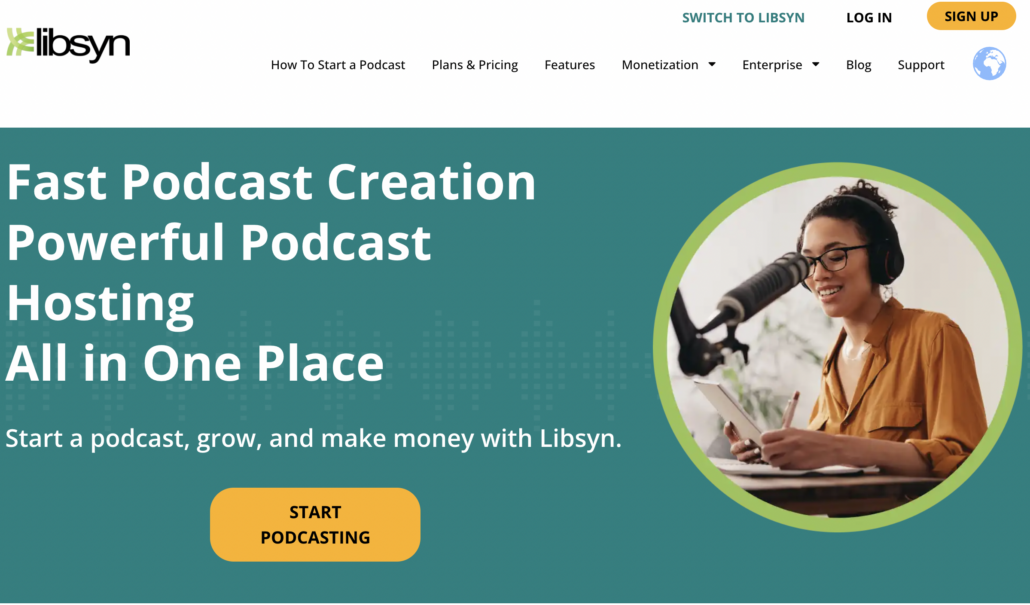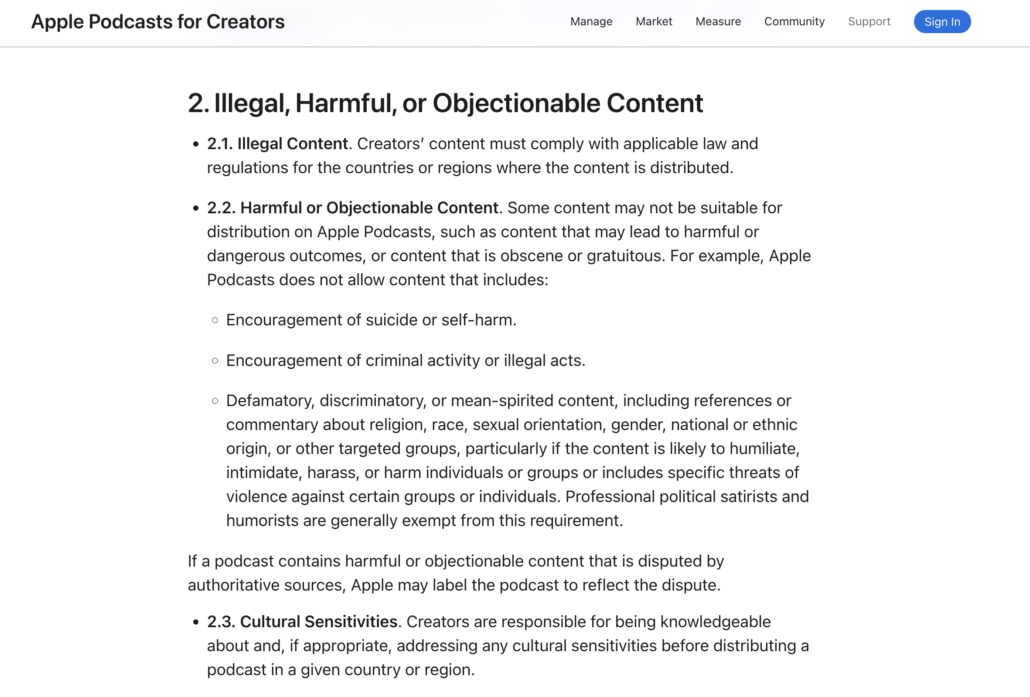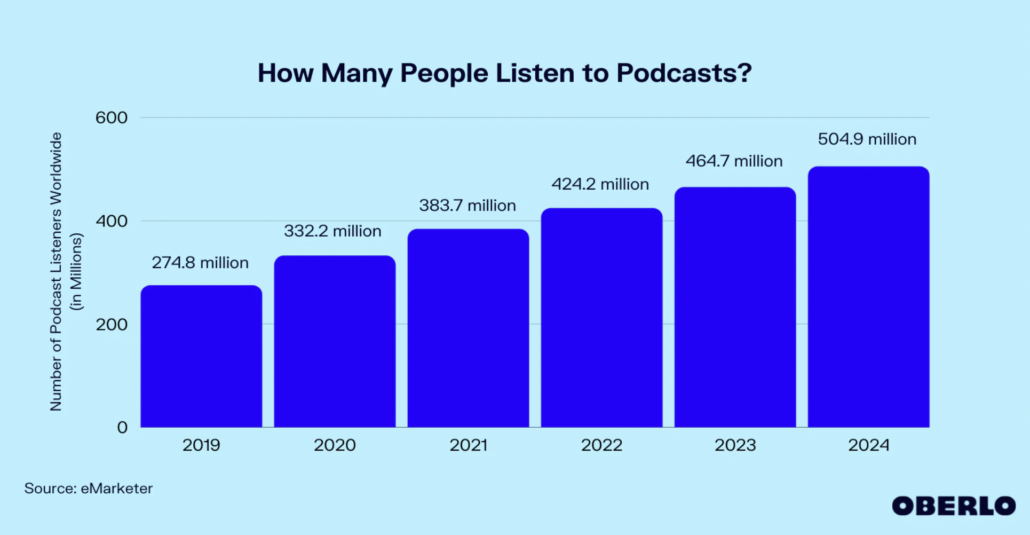Podcasting vs. Blogging: Which is Right For You?
I’ve been blogging for over two decades, and I’ve been podcasting for less than half of that time. Beyond the obvious differences between the two (speaking vs. writing), podcasting and blogging are actually more distinct than you might realize.
They’re not interchangeable whatsoever, and the benefits of podcasting will generate different results than the benefits of blogging.
I’m sure most of you landed on this page because you’re trying to decide whether podcasting or blogging is the best option for your situation. Whether you’re interested in blogging and starting a podcast for your business or personal brand, you’ve come to the right place.
Key Differences Between Podcasting and Blogging
Let’s take a closer look at the most significant differences between podcasts and blogs. You should start to get a feel for which option seems right for you as you go through this section.
Skills
Blogging requires solid writing and editing skills. Starting a blog requires lots of self-discipline and motivation. You should possess strong research skills, SEO skills, and know how to tell a story.
But the ability to write well is only half of the battle. You must also enjoy writing to be a successful blogger. If it feels like a chore, you’re going to have a tough time getting words on the page.
Strong speaking skills are important for podcasters. The ability to listen well is also important, especially if you’re planning to interview guests. Knowing how to converse naturally with people and let conversations flow will be extremely helpful for podcasting.
Startup Requirements
To start a blog, you’ll need a domain name and web hosting provider. You’ll also need a content management system (CMS) to publish your blogs on the web. WordPress is going to be the best option for the vast majority of you.
These minimum requirements will cost you less than $100 or $200. Your web hosting plan will likely be the highest upfront cost, as you typically need to pay for a year or two in advance to get the lowest monthly rate. But once this is all setup, you can get started and publish blogs the same day your site goes live.
Podcasting also requires a hosting subscription, and Libsyn is a great option to consider. This is how your podcasts will get delivered to the different streaming platforms, such as Apple Podcasts or Spotify.
I have a step-by-step guide on how to use Libsyn for podcast hosting if you’re interested in going that route.
You’ll also need a microphone, some soundproofing equipment, and editing software for your podcast. Some of you may decide to record a video version of your podcast as well, which will require a camera—but that’s optional. All in you can get your podcast setup for under $500.
Branding
Bloggers do have the ability to establish their own unique voice and writing style. However, if people are finding your blogs through Google searches, instead of being active readers it’s going to be tougher to establish your brand voice. Fortunately, people are forced to land on your website to read your blog, so your visual branding—like your business name, colors, and logos—will be obvious.
With podcasts, your brand (literally) speaks volumes. It shouldn’t take listeners too long to figure out who you are and what you represent. Your tone and choice of words will really go a long way in establishing your brand image here. For example, using lots of profanity and slang terms probably isn’t the best approach for a lawyer, but it can be fine for a comedian.
Flexibility
Generally speaking, blogs are more flexible than podcasts.
I love blogging over other forms of written content because there aren’t any rules. Your grammar doesn’t have to be perfect, and you can use unique formatting and stylistic choices—if you please. You also have the flexibility to add videos, images, GIFs, graphs, charts, and other types of media to your blog. You can even add the audio file of a podcast to your blog.
Beyond some extreme examples, you can really do or say anything you want in your blog. It’s the internet, and nobody is going to censor your opinion.
Podcasts are somewhat flexible, but you still need to maintain certain guidelines. Podcasting platforms have rules that must be followed, or they won’t host your content. For example, here are some of Apple’s community guidelines for podcasters:
In short, if you truly want complete freedom to say anything you want, podcasting may not be right for you.
Making Money
For businesses, your blog can serve as a way to drive website traffic that will ultimately convert to a sale. Whether that’s for a physical product, service, or subscription, you can add CTA buttons and quick product pitches throughout your written content to make money.
Alternatively, lots of blogs make money through ad space and affiliate marketing. You can get paid to promote specific products or services on your blog and earn a commission if a reader signs up using your affiliate link.
Generating direct sales from podcast listeners is a bit tougher. That’s because those people aren’t already on your website. So it requires them to take an extra step in your conversion funnel.
That’s why advertising is the most popular money-maker for podcasters. You can run ads before, during, or after your episodes and get paid based on how many listeners you have.
Popularity
Roughly 77% of internet users read blogs. With more than 5.3 billion internet users worldwide, that’s over four billion blog readers out there.
Podcasting popularity is a bit more modest. About 500 million people listen to podcasts, although that number has shot up more than 80% alone over the past five years.
If you look at the graph, you’ll see that podcast popularity is steadily rising. But in terms of total volume, it’s nowhere near blogs—at least not yet.
Competition
The great part about blogging is that people can naturally stumble upon your website and blog content when they’re searching for something on Google. That’s the benefit of having great SEO skills.
It’s much harder for someone to randomly discover a podcast. You’ll need to market yourself on other channels to effectively drive listeners to your show.
In fact, 60% of podcast listeners say they discovered a new podcast via social media. This is the most popular way that people find new podcasts. 57% of people find podcasts through word of mouth, and 53% hear about new podcasts by listening to other podcasts.
Pros and Cons of Podcasting vs. Blogging
Podcasts and blogs each have their own unique advantages. But they also have some drawbacks to consider.
Podcasting Pros
- Podcast listeners are loyal and can be very valuable to your brand
- Podcast ads usually pay more than blog ads
- Podcasts can typically be recorded in 60 to 90 minutes
- You can edit your podcast before it goes live
- You can network with other podcasters by inviting guests on your show
Podcasting Cons
- The startup costs are more expensive than starting a blog
- It’s harder to grow your podcast audience and get new listeners
- Getting clean audio every time takes some practice
- You need to follow the guidelines set forth by podcasting platforms
Blogging Pros
- You have the freedom to write about anything you want on your blog
- Blogs have lower startup and ongoing maintenance costs
- You can blog from anywhere
- Blogs have more monetization options than podcasts
Blogging Cons
- Some blogging platforms have a steep learning curve
- You need to be comfortable managing the backend of your site
- Learning SEO and getting your content ranked high on Google isn’t easy for beginners
When to Start a Podcast
There’s no clear rule on when a podcast is better than a blog. But here are some common scenarios where podcasting makes more sense than blogging:
- You have 1-2 hours per week available to record new episodes
- You want to establish a personal connection with your listeners
- You want to interview experts in your industry or niche
- You want to grow and establish your personal brand name
- You’re trying to provide content that’s easily consumed on the go
When to Start a Blog
If any of the scenarios below sound like your unique situation, you may want to consider starting a blog:
- You have 10-20+ hours per week dedicated to writing content
- You want to drive more traffic to your existing website
- You’re comfortable managing the tech that powers your site
- You want to quickly turn readers into conversions
- You’re looking for multiple ways to monetize content
Final Thoughts (and a Pro Tip): Is Podcasting or Blogging Better?
There’s no clear winner when it comes to starting a podcast or starting a blog. There are just certain situations where one is better than the other.
For example, starting a podcast doesn’t necessarily make sense if you’re running an ecommerce website. Getting people to listen to your podcast won’t directly contribute to more sales. Conversely, starting a blog wouldn’t make sense for a comedic duo that wants to get their names out there and practice jokes with guests.
If you don’t have a clear-cut decision on whether podcasting or blogging is better for you—do both. While this may seem like a tall task at first, doing one actually makes it easier to do the other.
Coming up with content ideas is arguably the hardest part of each. But if you’re doing both, you can easily turn your podcasts into blogs and vice versa. Your blog instantly becomes another medium to promote your podcast, and your podcast can simultaneously create more awareness about your blog.
Running a podcast and blog together can be the ultimate strategy for increasing brand awareness, reaching more people, and making more money.






Leave a Comment!